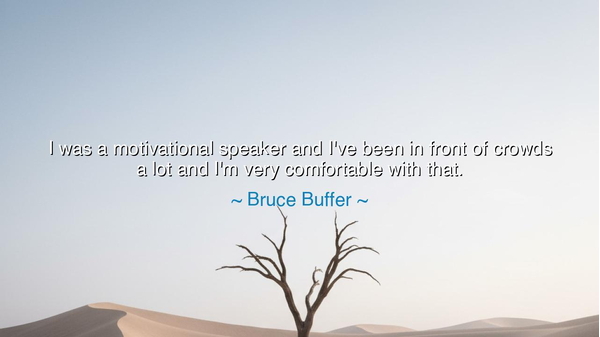
I was a motivational speaker and I've been in front of crowds a
I was a motivational speaker and I've been in front of crowds a lot and I'm very comfortable with that.






Hear the words of Bruce Buffer, the herald of the fighting ring, who declared: “I was a motivational speaker and I’ve been in front of crowds a lot and I’m very comfortable with that.” These words may sound plain, yet they hold within them a timeless truth about mastery, presence, and the courage to stand before the eyes of many. For the voice that carries to the multitude is not born in a moment—it is forged in trial, repetition, and the unshakable spirit that grows only when fear is faced again and again.
The meaning is clear: to be a motivational speaker is to carry words like fire, to ignite hearts that are weary, to stir the soul of a crowd with the spark of belief. But this calling is also a training ground. In learning to move audiences with speech, one learns the rhythm of human energy, the ebb and flow of attention, the rise of silence before the roar of response. Thus, when Buffer says he is comfortable, he does not speak of arrogance, but of hard-earned ease, born from standing often in the heat of many gazes.
History shows us that those who move crowds shape the fate of nations. Recall Demosthenes, the Athenian orator, who as a boy stammered and was mocked, yet trained his tongue with pebbles in his mouth until his voice thundered with persuasion. Or recall Winston Churchill, who, though ridiculed in youth for his halting speech, became the voice that steeled a nation in its darkest hour. So too, Bruce Buffer, though of a different stage, carries the same lineage: one who through practice transformed nerves into mastery, turning words into weapons of confidence.
His journey also reveals the link between motivation and performance. The skill of the motivational speaker lies not only in words but in presence—in the ability to project strength, to fill the room with certainty, to let every listener feel seen. These are the very skills Buffer carried into the fight arena, where his voice, thunderous and commanding, became part of the spectacle itself. The crowd rises not only for the fighters, but for the energy he brings, the ritual of declaration that binds them into one.
The lesson for us is this: mastery over fear comes through repetition, and comfort comes not before trial but after it. If you would stand before crowds, you must first accept the trembling of the hands and the racing of the heart. Each appearance, each effort, is a step toward confidence. And in time, what once seemed unbearable becomes natural, even joyful. Thus, the path from fear to comfort is not mystery, but practice.
Consider also the deeper meaning: every life has its crowds, whether great or small. For some, it is the boardroom; for others, the classroom; for others still, the family gathered at the table. In each setting, the courage to speak with clarity, to inspire with conviction, is a gift. If you would lead, if you would guide, you must learn, as Buffer did, to become comfortable not in hiding, but in shining before others.
Therefore, take practical steps: seek opportunities to speak, even when afraid; prepare your words, but more importantly, prepare your heart; and remember that the crowd, though many-headed, is always human—listening, hoping, waiting for a voice that can stir them. Become that voice, and you will find that leadership is not only for the chosen few, but for all who dare to stand and speak.
So let Bruce Buffer’s words endure: “I was a motivational speaker … and I’m very comfortable with that.” This is not mere self-description—it is a reminder that skill and confidence are born through effort, that presence is a power cultivated, not inherited. And it is an exhortation to us all: stand, speak, and grow into the fullness of your voice, until you too may be comfortable before any crowd, carrying truth and strength to those who need it.






AAdministratorAdministrator
Welcome, honored guests. Please leave a comment, we will respond soon